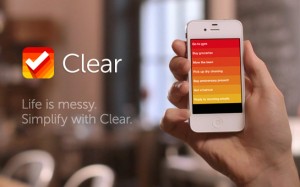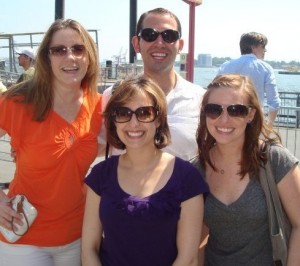Simple and Fun Productivity App
 I used to exclusively make my lists on paper but since I started using an iPhone — I’ve tried lots of apps. Some of my favorites are Astrid, Wunderlist and Ziplist. Most recently I downloaded Clear. It’s the newest breed of productivity app with an amazing design. It costs $1.99 in the Apple app store.
I used to exclusively make my lists on paper but since I started using an iPhone — I’ve tried lots of apps. Some of my favorites are Astrid, Wunderlist and Ziplist. Most recently I downloaded Clear. It’s the newest breed of productivity app with an amazing design. It costs $1.99 in the Apple app store.
A List Between Friends
 As we head into the weekend I’m reminded of one of my favorite things to do – get together with friends. Once a week my closest friends and I try to make time to get together for dinner and catch up. We’re all professionals in New York City with hectic schedules so some weeks are easier than others. But we always make an effort to meet up to enjoy some good conversation, delicious food and wine. (You guessed it – this is a Pinot Grigio crowd.)
As we head into the weekend I’m reminded of one of my favorite things to do – get together with friends. Once a week my closest friends and I try to make time to get together for dinner and catch up. We’re all professionals in New York City with hectic schedules so some weeks are easier than others. But we always make an effort to meet up to enjoy some good conversation, delicious food and wine. (You guessed it – this is a Pinot Grigio crowd.)
We have a ritual every week, which I started, of making an agenda of all the topics we’d like to cover. I know it’s a bit neurotic but my friends have embraced my list making and it really works for us! Read more
Successful To-Do List Junkie Shares Secrets
 Finally — someone who might be more obsessed with to-do lists than me. Sasha Cagen wrote a book all about lists called “To-Do List: From Buying Milk to Finding a Soul Mate, What Our Lists Reveal About Us” and she actually analyzed lists sent in by ordinary people. I thought she’d be the perfect featured list producer this month so I asked her a few questions:
Finally — someone who might be more obsessed with to-do lists than me. Sasha Cagen wrote a book all about lists called “To-Do List: From Buying Milk to Finding a Soul Mate, What Our Lists Reveal About Us” and she actually analyzed lists sent in by ordinary people. I thought she’d be the perfect featured list producer this month so I asked her a few questions:
Q: Why do you call yourself a compulsive list producer? Read more

